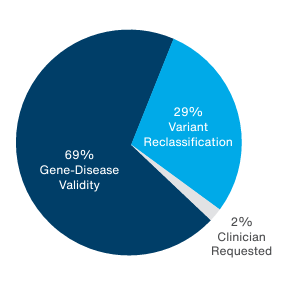Understanding Exome Reanalysis
Exome reanalysis is a process that involves assessing all 20,000 of a patient's genes, despite only having a concrete understanding of the functions of around 5,000 to 6,000. However, the gap in this understanding is rapidly closing. Scientific research characterizes approximately one new gene every two days. Therefore, a patient's exome becomes outdated every few years without reevaluating results identified in these newly characterized genes.
One of the unique benefits of exome testing is the ability to return to the data from the initial analysis and reevaluate it for new, clinically relevant findings. In fact, guidelines from the American College of Medical Genetics and Genomics (ACMG) advise that exome reanalysis should be considered every 1 to 2 years, due to the rapid expansion of genomic knowledge and discovery of new genes and variants that are linked to disease.1
Based on this guidance, genetic counselors are trained to request an exome reanalysis every few years, ensuring updated knowledge of the patient's genetic code. Reanalysis is typically requested when a patient's phenotype changes, or enough time has passed to warrant a review of new genes.
But when does a healthcare provider really need to request reanalysis?
Minimizing the Burden for Clinicians through Laboratory-driven Reanalysis

When patients are tested at Ambry Genetics, most exome reanalysis is laboratory-driven. The Ambry Patient for Life™ Program is our proactive reanalysis workflow that occurs when new gene-disease associations or variant classifications are identified. We automatically issue an amended report when new clinically relevant results are identified by our Patient for Life Program, and your local genomic science liaison reaches out directly to discuss why the report was updated. This program eliminates the need for providers to regularly request a reanalysis.
In fact, in our experience, less than 2% of clinically relevant exome report updates have been identified following clinician-initiated reanalysis requests.2
The Patient for Life program ensures that healthcare providers can focus on their primary task—attending to their patients—with the peace of mind that Ambry is staying up to date with new genetic research that could impact patients.
When to Request an Exome Reanalysis
Should the patient's phenotype change—indicating a shift in their symptoms or physical characteristics—providers can (and should!) request reanalysis. This clinical information changes how we, as a laboratory, analyze the exome data and interpret results that can guide the medical care of the patient.
Unlike some other laboratories, Ambry does not charge for these reanalysis services.
We've made the reanalysis request process straightforward and easy. Providers need only submit a form available on our website, along with the patient’s updated clinical notes and test results, if relevant. We will complete a reanalysis notice for unchanged reports or we will issue an amended report when a new finding is identified, or a variant is reclassified. Turnaround time for a reanalysis request is 6-8 weeks.
In an age where medical care is becoming more personalized and data-driven, Ambry is proud to offer leading-edge services such as exome reanalysis. We are committed to evolving alongside this exciting field, ensuring the best care for patients, and making life easier for healthcare providers.
Additional Resources
Learn more about the Ambry Patient for Life Program
Download the Patient for Life whitepaper
Download the Exome Reanalysis Request form
References:
1. Deignan JL, Chung WK, Kearney HM, et al. Points to consider in the reevaluation and reanalysis of genomic test results: a statement of the American College of Medical Genetics and Genomics (ACMG). Genet Med. 2019;21(6):1267-1270. doi:10.1038/s41436-019-0478-1
2. Ambry Genetics, internal data.



